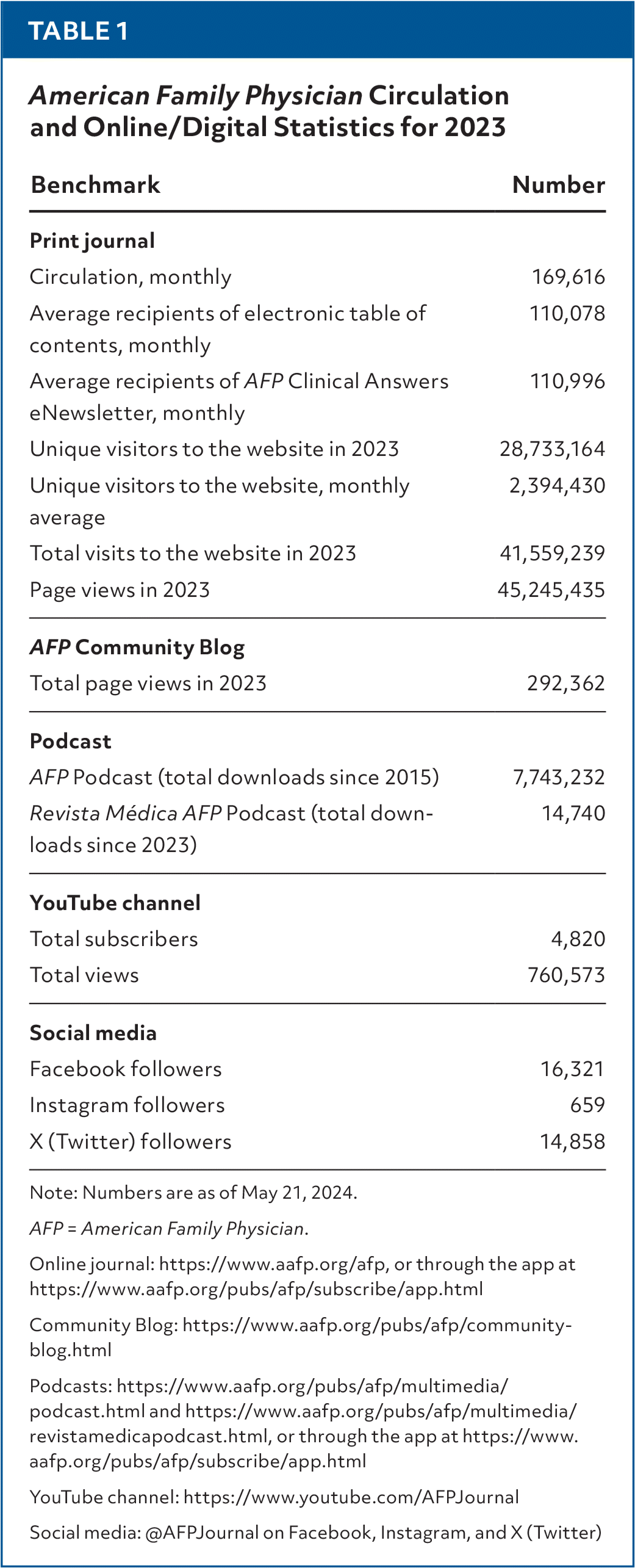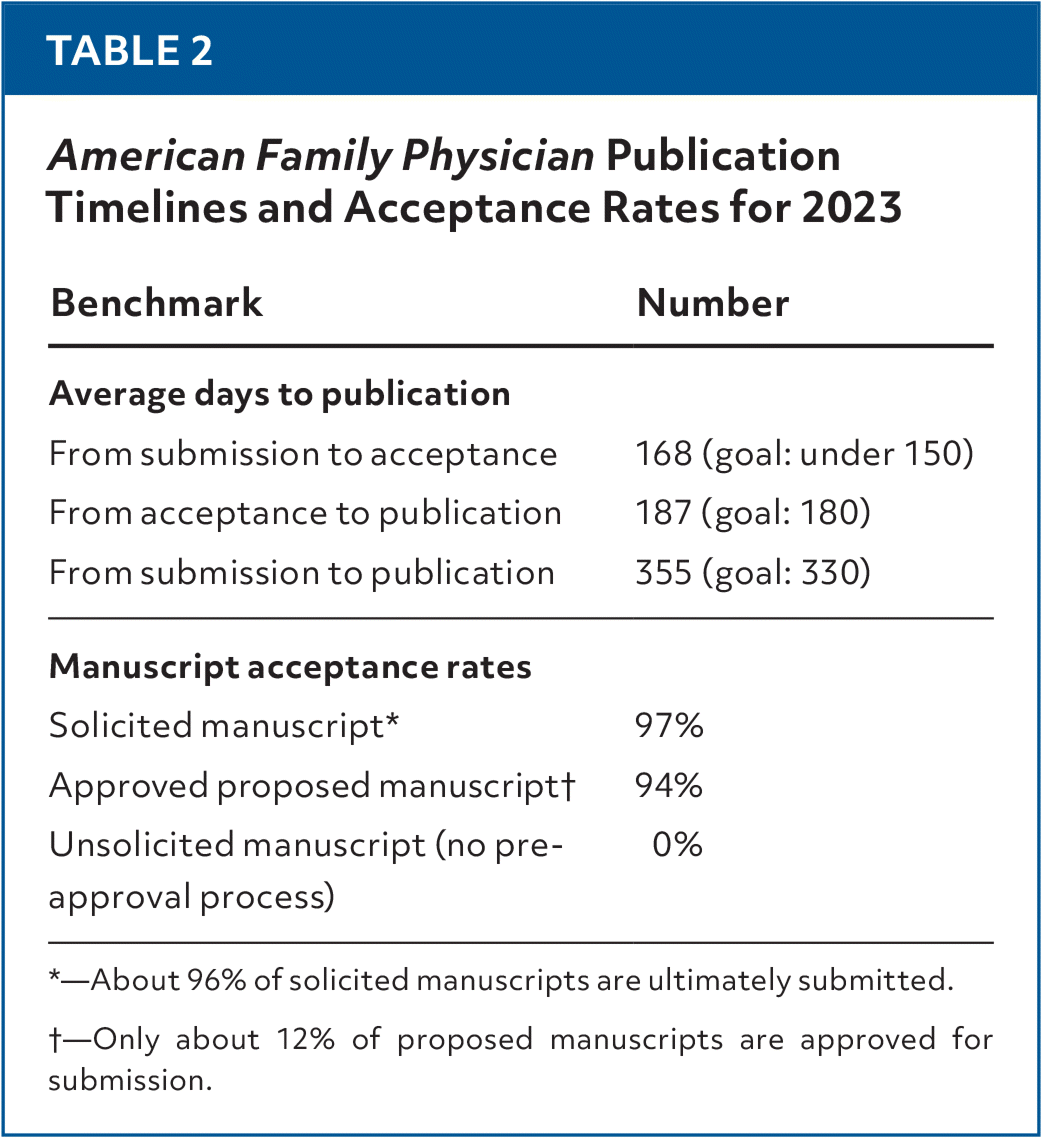
Am Fam Physician. 2024;110(1):13-15
Author disclosure: No relevant financial relationships.
This is American Family Physician's (AFP's) 74th year of publication and the seventh annual editorial in my role as editor-in-chief to update readers on new editorial team members, AFP's top viewed content, circulation and website statistics, and important journal initiatives, and to thank our treasured peer reviewers.1–6
MEDICAL EDITING FELLOW, AND RESIDENT AND STUDENT REPRESENTATIVES
The AFP team welcomes Dr. Michelle Nelson as this year's Jay Siwek Medical Editing Fellow. Dr. Nelson serves as associate program director and core faculty at Michigan State University Medical Center Alma Family Medicine Residency. Her role includes a focus on research and point-of-care ultrasonography. You can read more about her background and interests in the AFP Community Blog, Introducing the 2024-2025 AFP Jay Siwek Medical Editing Fellow: Dr. Michelle Nelson.
In addition to fellows, AFP has resident and student representatives who assist with various projects throughout the year and typically serve annual terms from January through December. Adedayo O. Jobi-Odeneye, a third-year medical student at Ross University School of Medicine in Barbados, serves as the student representative and has already contributed so much this year. More information about the representative positions is available: Resident Member of the American Family Physician Editorial Board and Student Member of the American Family Physician Editorial Board.
The AFP Photo Contest is an ongoing project created by the resident and student representatives. Residents and students are encouraged to share their stories about how they use AFP through photographs. The 2024 winners are featured in this issue and will be announced at the American Academy of Family Physicians (AAFP) National Conference for family medicine residents and medical students in August.
AFP'S TOP 20 ARTICLES OF 2023
Don't miss the top 20 AFP articles that were most viewed by readers online last year.7 Popular article topics included hypertension, syncope, fibromyalgia, menopause, osteoporosis, asthma, chronic kidney disease, and childhood and adolescent sports-related overuse disorders. This top 20 list is the basis for selecting the AFP Article of the Year Award winner, which will be announced in September at FMX in Phoenix, Ariz., and in a fall issue of AFP. The 2022 award went to the authors of “Evidence-Based Contraception: Common Questions and Answers.”8
The top 10 AFP Community Blog posts of 2023 were highlighted in the December 26, 2023, post.9 Topics include “Fran-kenstein opioids,” berberine (“nature's Ozempic”), respiratory syncytial virus vaccination, accurate blood pressure measurements, major depressive disorder, and U.S. Preventive Services Task Force breast cancer screening changes.
One of AFP's most popular article series, the top research studies of 2023 for primary care physicians (top 20 POEMs [patient-oriented evidence that matters]), is in this issue of AFP.10 A collection of articles in this series published in AFP is available.
CIRCULATION, WEBSITE STATISTICS, DIGITAL CHANNELS
The circulation of AFP's print journal is more than 169,000 (Table 1). To the best of our knowledge, it is the second-largest circulation of any medical journal, based on an independent publication auditing firm.11 AFP has consistently been rated the number one journal among primary care physicians.12

| Benchmark | Number |
|---|---|
| Print journal | |
| Circulation, monthly | 169,616 |
| Average recipients of electronic table of contents, monthly | 110,078 |
| Average recipients of AFP Clinical Answers eNewsletter, monthly | 110,996 |
| Unique visitors to the website in 2023 | 28,733,164 |
| Unique visitors to the website, monthly average | 2,394,430 |
| Total visits to the website in 2023 | 41,559,239 |
| Page views in 2023 | 45,245,435 |
| AFP Community Blog | |
| Total page views in 2023 | 292,362 |
| Podcast | |
| AFP Podcast (total downloads since 2015) | 7,743,232 |
| Revista Médica AFP Podcast (total downloads since 2023) | 14,740 |
| YouTube channel | |
| Total subscribers | 4,820 |
| Total views | 760,573 |
| Social media | |
| Facebook followers | 16,321 |
| Instagram followers | 659 |
| X (Twitter) followers | 14,858 |
The AFP website received an average of about 2.8 million unique visitors per month (attributable to a unique browser or device) in 2023, making it one of the most popular online medical publications. This means that in addition to visits by members of the AAFP, the website is viewed by millions of other health care professionals and others who presumably are seeking information about various clinical conditions. Additionally, roughly 2.7 million CME quiz credits are awarded annually.
Beyond the print and website versions, many engage with our clinical content through the AFP Podcast, Revista Médica AFP Podcast (our Spanish-language podcast), social media channels (Facebook, Instagram, X [Twitter]), and AFP YouTube channel. We continue to build our video collection and invite submissions. Clinical videos are peer-reviewed and provide an opportunity for residents and students to submit to the journal. Video submission instructions are available.
PUBLICATION TIMELINES, ACCEPTANCE RATES, AUTHOR DEMOGRAPHICS
On average, review articles are accepted 5 to 6 months after they are submitted, which allows time for peer review, author revisions, and medical editing (Table 2). Articles are typically published 6 to 7 months after acceptance, with the goal of providing readers with a mix of article topics scheduled in each issue. Articles that go online ahead of print are typically published online within 4 to 5 months of acceptance.

| Benchmark | Number |
|---|---|
| Average days to publication | |
| From submission to acceptance | 168 (goal: under 150) |
| From acceptance to publication | 187 (goal: 180) |
| From submission to publication | 355 (goal: 330) |
| Manuscript acceptance rates | |
| Solicited manuscript* | 97% |
| Approved proposed manuscript† | 94% |
| Unsolicited manuscript (no pre-approval process) | 0% |
To ensure comprehensive coverage of a curriculum of topics, we solicit most of the articles that are published. We circulate a “call for papers” through multiple family medicine communication platforms and post it on social media and online. Our preference is for the first author to be an experienced clinician and writer because our readership largely consists of busy physicians who rely on AFP for practical, evidence-based content and CME. However, congruent with AFP's mission to promote health equity and scholarship in family medicine, we strive to increase diverse authorship by encouraging experienced authors to mentor coauthors, especially authors from groups that are underrepresented in medicine.13 To measure our progress in diversity and mentorship, since 2021, we have been collecting anonymous demographic data after publication from authors who volunteer to share information about their gender, race, and ethnicity. This information is not used to inform decisions about submitted manuscripts and future publication.
Authors who propose unsolicited topics go through a formal approval process before submitting a manuscript for consideration. Because only 12% of proposed topics are accepted due to duplicate topics or not fitting with AFP's curriculum, authors are strongly encouraged to read the AFP Authors' Guide before contacting us.
ACKNOWLEDGING PEER REVIEWERS
Peer review is an essential and valuable process for AFP, and we are very appreciative of the work reviewers do in helping us develop sound content for the journal. Each year, we recognize all peer reviewers for volunteering their time and highlight those reviewers who provided exceptional feedback. An archive of past AFP peer reviewers is available.
If you are interested in reviewing for AFP, please read the AFP Reviewers' Guide for more information. Please also encourage specialist colleagues whom you regularly collaborate with to consider reviewing as well. We highly recommend that new reviewers find a mentor for their first review, which could include colleagues with authorship experience, department chairs and faculty, and residency directors. The AAFP has authorized CME credit for peer review of journal manuscripts.
Next year, we will celebrate AFP's 75th year of publication, which would not be possible without the dedication of our authors, editors, reviewers, and loyal readers, who all help make AFP the best-read journal in primary care. As always, we welcome your feedback. Please send comments to afpjournal@aafp.org.
Editor’s Note: Dr. Sexton is editor-in-chief of AFP.
